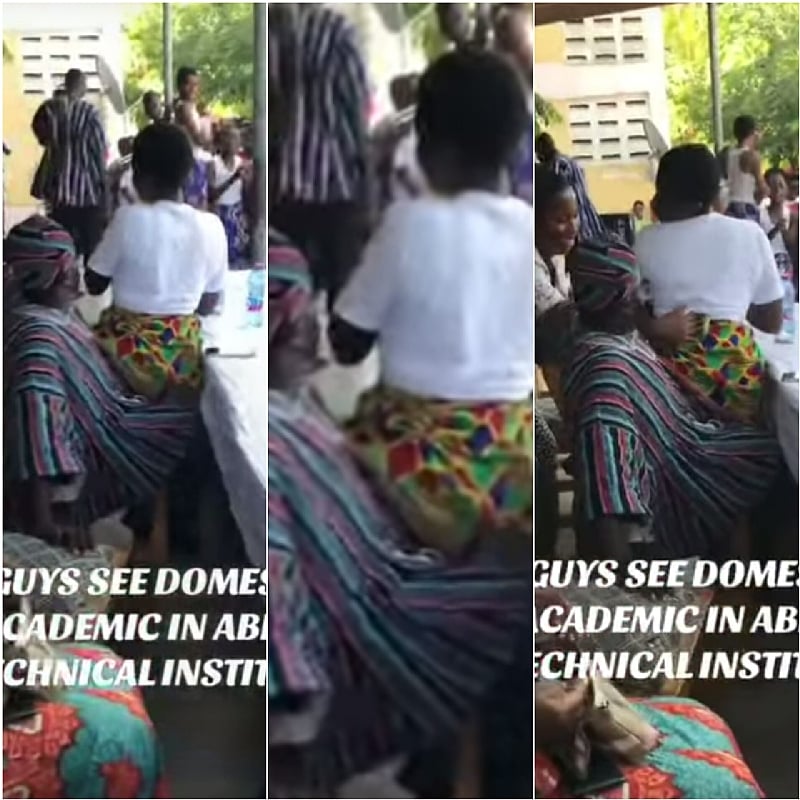The viral video depicting a female student from Abetifi Technical Institute twerking on her headmaster’s lap during a school event has ignited a firestorm of controversy, raising fundamental questions about appropriate conduct within educational settings, the boundaries between students and administrators, and the overall impact on the learning environment. The incident, captured during an internal extracurricular activity, showcases the student energetically dancing before positioning herself on the headmaster’s lap. This provocative act unfolded in full view of other students and staff, prompting a female teacher to intervene and remove the student from the headmaster’s lap, thereby diffusing the potentially escalating situation. The ensuing public discourse reflects a polarized spectrum of opinions, with some commending the student’s confidence and spirited performance, while others express deep concern over the appropriateness of such behavior within the confines of a school environment.
The incident serves as a stark reminder of the complex dynamics at play within educational institutions. While schools are intended to foster learning and personal growth, they also serve as microcosms of society, reflecting the broader cultural norms and values. This particular incident throws into sharp relief the ongoing debate surrounding the appropriateness of certain behaviors, particularly those with sexual connotations, within the context of an educational setting. The act of twerking, often associated with sexual expression, clashes with the traditional expectation of decorum and respect expected within a school environment. This clash of expectations underscores the challenges faced by educators in navigating the ever-evolving cultural landscape and maintaining an environment conducive to learning.
The video’s rapid spread across social media platforms has amplified the debate, drawing attention to the blurring lines between personal expression and professional conduct. While some argue that the student’s actions should be viewed as a harmless display of youthful exuberance, others contend that it represents a transgression of boundaries and a potential erosion of the respect that should exist between students and authority figures. The headmaster’s passive acceptance of the student’s behavior further complicates the issue, raising questions about his judgment and responsibility to maintain an appropriate atmosphere within the school. This inaction could be interpreted as tacit approval, potentially emboldening similar behavior in the future and undermining the authority of the school administration.
The incident also brings into focus the broader societal conversation about consent and the power dynamics inherent in relationships between students and educators. While the student’s actions may have been initiated voluntarily, the inherent power imbalance between a student and the headmaster raises concerns about the potential for coercion or undue influence. Even in the absence of explicit coercion, the context of the situation creates a gray area where the student’s autonomy and judgment may be compromised by the authority figure’s presence. This highlights the importance of clear guidelines and professional boundaries within educational institutions to protect students from potentially exploitative situations.
Abetifi Technical Institute, established in 1977 as a mixed-gender institution offering a diverse range of technical courses, now finds itself at the center of a national conversation about appropriate conduct within schools. The institute’s reputation and its role in shaping the future generation of skilled professionals are now intertwined with this incident. The school’s response to this controversy will be crucial in demonstrating its commitment to maintaining a conducive learning environment. This incident underscores the need for clear policies and procedures that address student conduct, teacher responsibilities, and the importance of fostering a culture of respect within the school community.
Moving forward, Abetifi Technical Institute has an opportunity to use this incident as a catalyst for positive change. A thorough investigation of the circumstances surrounding the event, followed by appropriate disciplinary action if warranted, is essential to restoring trust and reinforcing the importance of professional boundaries. Furthermore, the incident presents a teachable moment for all stakeholders – students, teachers, administrators, and parents – to engage in open dialogue about appropriate conduct, respect, and the creation of a safe and conducive learning environment for all. This incident should serve as a reminder of the ongoing need for clear communication, consistent enforcement of rules, and proactive measures to prevent similar occurrences in the future.


